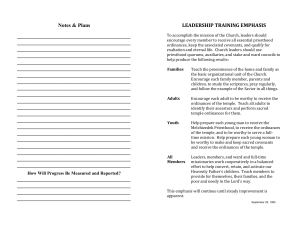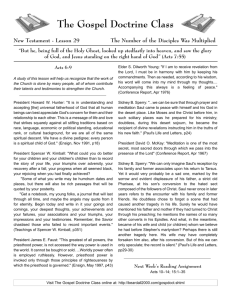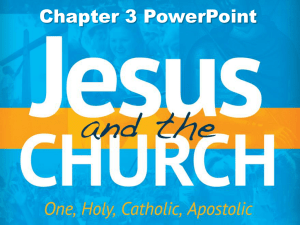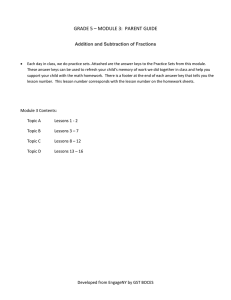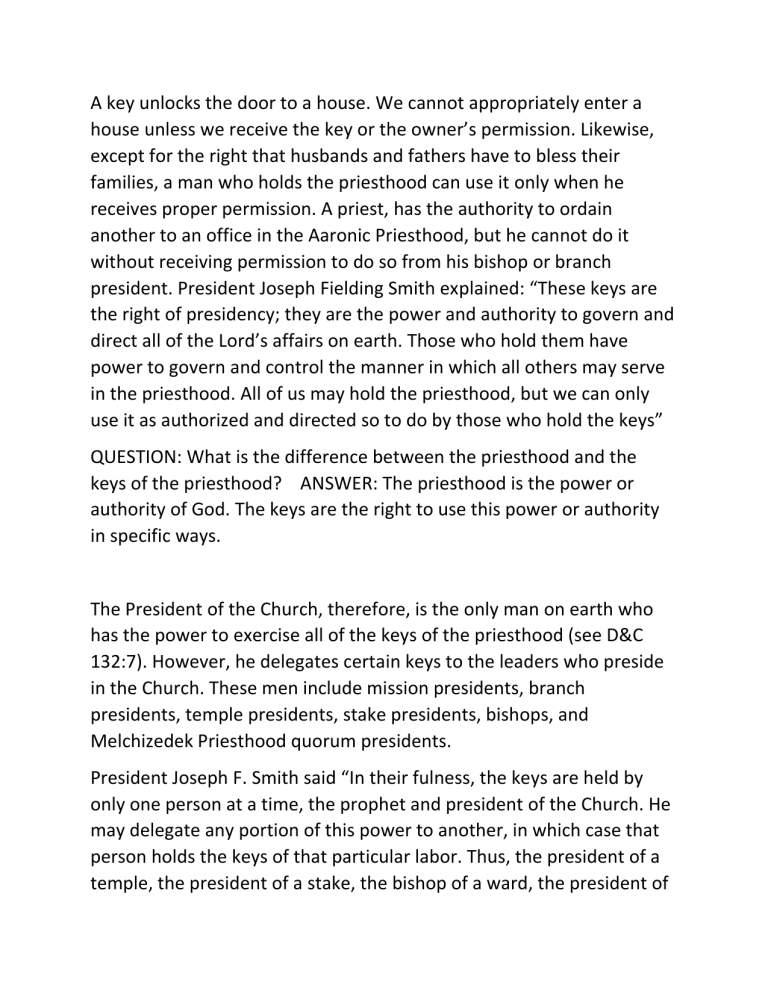
A key unlocks the door to a house. We cannot appropriately enter a house unless we receive the key or the owner’s permission. Likewise, except for the right that husbands and fathers have to bless their families, a man who holds the priesthood can use it only when he receives proper permission. A priest, has the authority to ordain another to an office in the Aaronic Priesthood, but he cannot do it without receiving permission to do so from his bishop or branch president. President Joseph Fielding Smith explained: “These keys are the right of presidency; they are the power and authority to govern and direct all of the Lord’s affairs on earth. Those who hold them have power to govern and control the manner in which all others may serve in the priesthood. All of us may hold the priesthood, but we can only use it as authorized and directed so to do by those who hold the keys” QUESTION: What is the difference between the priesthood and the keys of the priesthood? ANSWER: The priesthood is the power or authority of God. The keys are the right to use this power or authority in specific ways. The President of the Church, therefore, is the only man on earth who has the power to exercise all of the keys of the priesthood (see D&C 132:7). However, he delegates certain keys to the leaders who preside in the Church. These men include mission presidents, branch presidents, temple presidents, stake presidents, bishops, and Melchizedek Priesthood quorum presidents. President Joseph F. Smith said “In their fulness, the keys are held by only one person at a time, the prophet and president of the Church. He may delegate any portion of this power to another, in which case that person holds the keys of that particular labor. Thus, the president of a temple, the president of a stake, the bishop of a ward, the president of a mission, the president of a quorum, each holds the keys of the labors performed in that particular body or locality. His Priesthood is not increased by this special appointment” Both men and women can be called to a calling, only priesthood bearers are ordained to priesthood offices. These offices include deacon, teacher, priest, elder, high priest, bishop, patriarch, Seventy, and Apostle. Ordination to any of these offices enables a person to serve the Church in specific ways—but only, when given permission to do so by those who hold the keys of the priesthood. Because the priesthood is sacred, we must use it with care Order has always been a part of the Lord’s kingdom on earth. For example, Moses learned the necessity of order soon after he was called to lead the Israelites. The Israelites needed a leadership to lead them out of Egypt, but Moses found it impossible to lead thousands of people. He therefore chose “able men, such as fear God, men of truth” and called them to be rulers. He set apart some to be rulers of hundreds, some to be rulers of fifties, and others to be rulers of tens. He then taught them how to preside over their groups. Today our priesthood leaders—bishops and stake, district, mission, branch, and quorum presidents—are given the keys of the priesthood so we can be led in an orderly way and receive the necessary ordinances of the gospel. Church leaders have many responsibilities because they hold keys of the priesthood These responsibilities include: Interviewing those who are to receive ordinances. Explaining the importance of the ordinances. Determining whether members are ready to receive the ordinances. Keeping necessary records. Determining the worthiness of those who are to perform the ordinances. Asking someone to conduct the services of the Church. Asking for a sustaining vote from the members of the Church. By appointment of the Lord, a father is head of his home. At the head of the home, he must bear his priesthood honorably. If he does so, he will have the power to guide and bless his family in love and harmony. QUESTION: HOW HAVE YOU BEEN BLESSED HAVING THE PRIESTHOOD IN YOUR HOME. “In 1976 an area general conference was held in Copenhagen, Denmark. Following the closing session, President Spencer W. Kimball desired to visit the Vor Frue Church, where the Thorvaldsen statues of the Christus and of the Twelve Apostles stand. He had visited there some years earlier and wanted all of us to see it. To the front of the church, behind the altar, stands the familiar statue of the Christus with His arms turned forward and somewhat outstretched, the hands showing the imprint of the nails, and the wound in His side very clearly visible. Along each side stand the statues of the Apostles, Peter at the front to the right and the other Apostles in order. Most of our group was near the rear of the chapel with the custodian. I stood up front with President Kimball before the statue of Peter with Elder Rex D. Pinegar and Johan Helge Benthin, president of the Copenhagen stake. In Peter’s hand, depicted in marble, is a set of heavy keys. President Kimball pointed to those keys and explained what they symbolized. Then, in an act I shall never forget, he turned to President Benthin and with unaccustomed firmness pointed his finger at him and said, “I want you to tell everyone in Denmark that I hold the keys! We hold the real keys, and we use them every day.” I will never forget that declaration, that testimony from the prophet. The influence was spiritually powerful; the impression was physical in its impact. We walked to the back of the chapel where the rest of the group was standing. Pointing to the statues, President Kimball said to the kind custodian, “These are the dead Apostles.” Pointing to me, he said, “Here we have the living Apostles. Elder Packer is an Apostle. Elder Thomas S. Monson and Elder L. Tom Perry are Apostles, and I am an Apostle. We are the living Apostles. Although we have the authority to perform certain ordinances as priesthood holders, we still need to ask permission to do so the power to give this permission is called the keys of the priesthood. The prophet is the only man on earth that has all the priesthood keys, but he has given some of these keys to the leaders who preside over the units of the Church; they in turn grant us permission to use our priesthood to bless Heavenly Father’s children.
